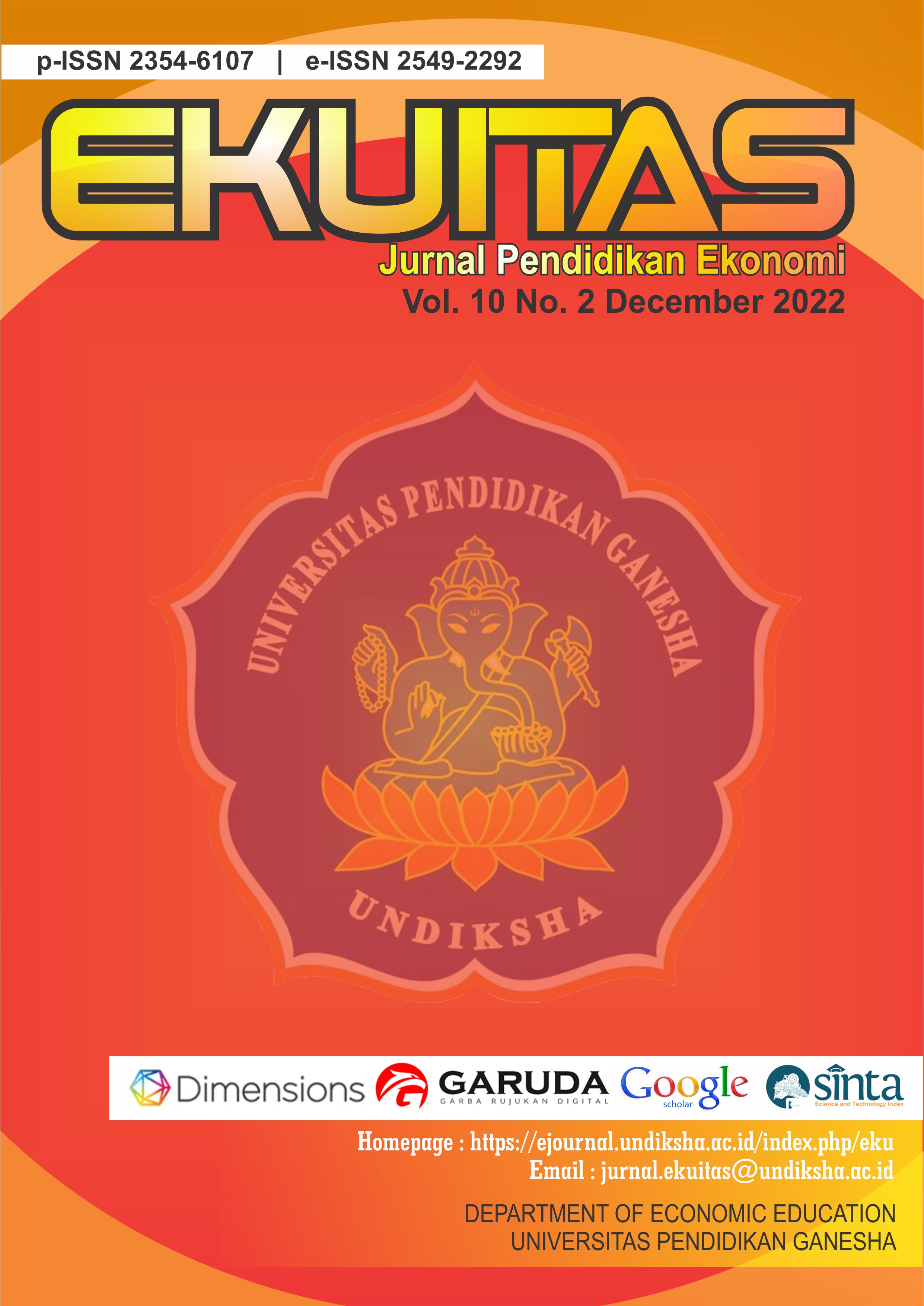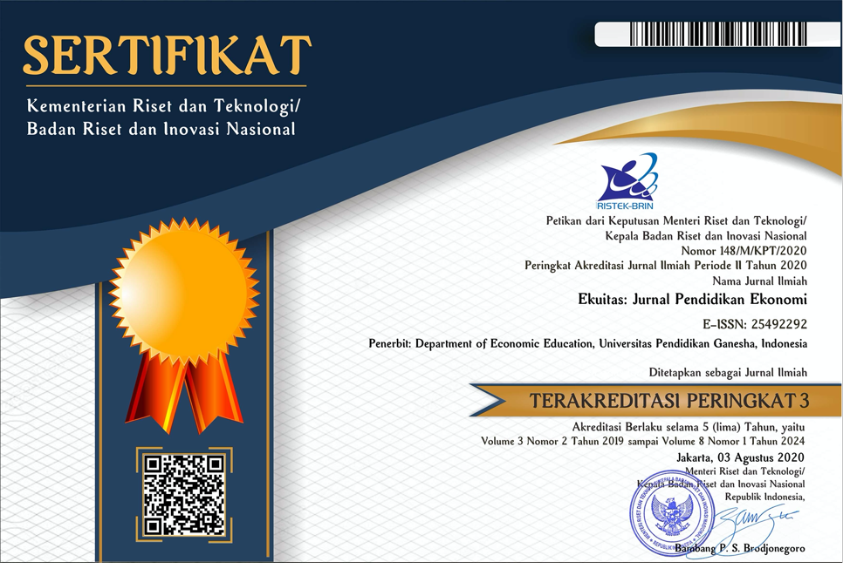Pembangunan Pariwisata di Desa Wisata Penglipuran Melalui Peran Partisipasi Masyarakat, Kewirausahaan Sosial Berkelanjutan dan Inovasi
DOI:
https://doi.org/10.23887/ekuitas.v10i2.52081Keywords:
Entrepreneurship, tourism, penglipuran, participationAbstract
In this research, which was conducted in Penglipuran Tourism Village, that in Penglipuran Tourism Village as one of the tourist villages visited by many tourists, to find out how to organize a village that is commercialized as a tourist destination and has cultural values, uniqueness and also interesting community habits. tourist interest. However, the economic aspect that has grown through tourist visits who make a visit has not been comparable to being accepted by the community in the midst of community participation, entrepreneurial activities and with the mediation of innovation variables. The sampling technique in this study is a purposive sampling technique, based on an ideal sample calculation, This study uses the Slovin technique with a margin of error of 5% with a total sample of 152 respondents. Methods of data collection using questionnaires and interviews in depth interviews. The data analysis method used a mix method with qualitative interview results used as a support for quantitative data analysis. The research hypothesis was tested using a Structural Equation Model (SEM) approach based on Partial Least Square (PLS). The results showed that all variables had a direct or indirect relationship.
References
Creswell, J. and Creswell, J., (2018). Research design. 5th ed. London: Sage.
Choi, H. C., and Sirakaya, E. (2006). Sustainability indica-tors for managing community tourism. Tourism Manage-ment, 27, 1274–1289.
Divisekera, S., and Nguyen, V. K. (2018). “Determinants of innovation in tourism evidence from Australia”. Tourism Management, 67, 157-167.
Elfianita, E. (2011). Pengembangan Pariwisata Berbasis Community Based Tourism (CBT) di Desa Wisata Limbasari Kecamatan Bobotsari, Kabupaten Purbalingga, Jurnal UNY.
Ghozali, I. (2018). Aplikasi Analisis Multivariate dengan Program IBM SPSS 25. Badan Penerbit Universitas Diponegoro: Semarang.
GSTC. (2017). GSTC Criteria - Global Sustainable Tourism Council (GSTC). Retrieved November 30, 2017, from https://www.gstcouncil.org/gstc-criteria/.
Hair, J. F., Ringle, C. M., and Sarstedt, M. (2017). PLS-SEM: Indeed a silver bullet. Journal of Marketing Theory and Practice, 19(2), 139e151. http://dx.doi.org/10.2753/ MTP1069-6679190202.
Holil. (1980). Partisipasi Sosial dalam Usaha Kesejahteraan Sosial. STKS. Bandung.
Kock, N. (2011). Using WarpPLS in e-collaboration studies: Descriptive statistics, settings, and key analysis results. International Journal of e-Collaboration, 7(2), 1-18. http://dx.doi.org/10.4018/jec.2011040101.
Deborah, D.L., Rachel, D. (2017). "Increasing sustainable tourism through social entrepreneurship", International Journal of Contemporary Hospitality Management, Vol. 29 Issue: 7, doi: 10.1108/IJCHM-02-2016-0096
Madiun, N. (2008). Partisipasi Masyarakat Lokal dalam Pengembangan Kawasan Pariwisata Nusa Dua (Perspektif Kajian Budaya). Disertasi. Program Pascasarjana Universitas Udayana. Denpasar. Tidak diterbitkan.
Mill, R. (2000). Tourism The International Business / Robert Christie Mill .
Muliawan, H. (2008). Pengembangan Pariwisata Berbasis Masyarakat Konsep dan Implementasi.
Murtiyanto, N. (2011). Partisipasi Masyarakat (Teori Ringkas). Posted on October 12, 2011. http://bagasaskara.wordpress.com.
Nuryanti, W. (1993). Concept, Perspective and Challenges, Laporan Konperensi Internasional Mengenai Pariwisata Budaya. [Online] : http://ejournal.unesa.ac.id/kajian-tentang-kesiapan-desa-margomulyo /2013. Yogyakarta : Universitas Gadjah Mada
OECD. (2008). Tourism in OECD countries: 2008 trends and policies. Paris: OECD Publishing.
Paturusi, S.A. (2001). Perencanaan Tata Ruang Kawasan Pariwisata, Materi Kuliah Perencanaan Kawasan Pariwisata, Program Pasca Sarjana Universitas Udayana Denpasar, Bali.
Pitana, I.G., Gayatri, P.G. (2005). Sosiologi Pariwisata, Yogyakarta: CV Andi Offset.
Scheyvens, R. (1999). Ecotourism and the Empowerment of Local Communities. Tourism Management, 20, 245-249.
Schumpeter, J.A. (1934). The theory of economic development. Cambridge (Mass): Harvard University Press.
Simonceska, L. (2012). The changes and innovation as a factor of the tourist offer: the case of Ohrid. Procedia-Social and Behavioral Sciences, 44(2012), 32-43.
Siregar, S. (2010). Statistika Deskriptif Untuk Penelitian. Jakarta: Pt Rajagrafindo Persada.
Soetrisno, L. (1995). Menuju Masyarakat Partisipatif. Kanisius. Yogyakarta. Edisi: Cetakan Pertama.
Sugiyono. (2015). Metode Penelitian Kombinasi (Mix Methods). Bandung: Alfabeta
Sugiyono. (2017). Metode Penelitian Kuantitatif, Kualitatif, dan R&D. Bandung : Alfabeta.
Sugiyono. (2019). Metode Penelitian Kuantitatif, Kualitatif R&D. Bandung: Alfabeta.
Sukanto. (1983). Beberapa Upaya untuk Meningkatkan Partisipasi Masyarakat dalam Pembangunan. Analisa. Yogyakarta.
The Global Sustainable Tourism Council. (2019). Kriteria Destinasi GSTC dengan Indikator Kinerja dan Tujuan Pembangunan Berkelanjutan. 0–17.
Torraco, R. J. (2002). Research Methods for Theory Building in Applied Disciplines: A Comparative Analysis. Advances in Developing Human Resources, 4(3), 355–376. https://doi.org/10.1177/15222302004003008
Tosun, C. (1999). Towards a typology of community participation in the tourism development process. International Journal of Tourism and Hospitality, 10, 113–134.
Undang Undang tentang Kepariwisataan. (2009). UU No. 10 Tahun 2009. Jakarta: Direktorat Jenderal Hukum dan HAM
UNEP and UNWTO. (2005). Making Tourism More Sustainable: A Guide for Policy Makers. Spain: World Tourism Organization.
Vodeb, K. (2012). Competitiveness of frontier regions and tourism destination management. Managing Global Transitions, 10(1), 51–68.
Volkmann, C., Tokarski, K., and Ernst, K. (2012). Social Entrepreneurship and Social Business. 10.1007/978-3-8349-7093-0.
Wojowarsito. (1976). Kamus Umum Lengkap : Inggris – Indonesia, Indonesia – Inggris. Penerbit Hasta. Bandung.
Wondirad dan Ewnetu. (2019). “Community participation in tourism development as a tool to foster sustainable land and resource use practices in a national park milieu”.
Yuningsih dan Nabila. (2016). Analisis Partisipasi Masyarakat Dalam Pengembangan Desa Wisata Kandri Kota Semarang. Jurnal Pariwisata, 1(2), 1-11.
Zahra, S A, Gedajlovic, E, Neubaum, D O, Shulman, J M. (2009). A typology of social entrepreneurs: Motives, search processes and ethical challenges, Journal of Business Venturing, 24(5): 519-532.
Downloads
Published
How to Cite
Issue
Section
License

This work is licensed under a Creative Commons Attribution-ShareAlike 4.0 International License.








